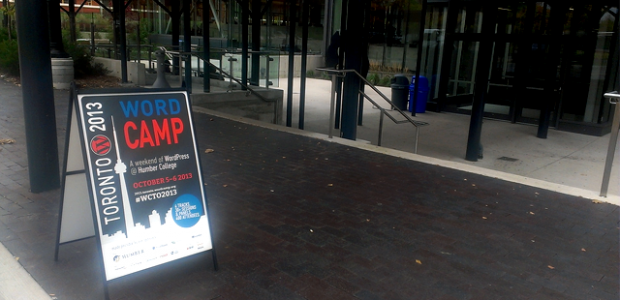
This is part our series on organizing WordCamps. Check out Getting Involved: WordCamp Organizing 101 for the full series. If you’re an organizer with advice to share, or a potential organizer with questions to ask, please get in touch with us!
Location, Location, Location.
The WordCamp Planning site has a lot to say about venues, and for good reason: finding a venue goes hand-in-hand with choosing the date as your most important (early) organizer tasks.
There are quite a few factors to consider when choosing a venue, and in my opinion, it boils down to three big categories:
- Accessibility: Easy to get to. Nearby parking. Wheelchair access.
- Technology: Availability of on-site A/V, wifi, and tech support.
- Cost: None. (I’ll explain our approach to this below.)
What venues worked for us? Colleges.
Toronto has had success working with local colleges (known as community colleges or technical colleges in the United States).
George Brown College hosted WordCamp Toronto 2011 and 2012, Humber College hosted 2013, and Centennial College hosted the events prior to our group taking over (2008-2010).
Colleges have great facilities. Classrooms are set up for presentations and workshops. There’s on-site A/V and large common areas. Cafeterias provide space for lunch and catering. There’s lots of parking, wheelchair access, nearby transit, and (best of all) open wifi.
Colleges are more inclined to help. In addition to having great facilities, they’re pretty enthusiastic about showing off their campus and introducing potential students to everything that they have to offer.
If colleges don’t work for you, look at other relevant schools and businesses. Whatever you go with, don’t just think of them as providing space. Think of them as hosts.
How did we secure our venue? Partnerships.
Try to position your WordCamp as a great partnership opportunity.
For 2011-2013 we got in touch with program directors through personal referrals and proposed a strategic partnership between WordCamp Toronto and the program.
For George Brown, it was Continuing Education. The relevance was that George Brown College offered certificates and programs in different disciplines related to WordPress.
For Humber College, it was the School of Media Studies & Information Technology. Like George Brown, Humber offers a lot of courses where WordPress would be a fit.
The intro/partnership proposal letter:
- Describes what you’re asking for. Be clear about it: You want to host WordCamp Your City at X venue in a particular season/month. It’ll be _ days long, starting on _ and ending on _.
- Explains what WordCamps and WordPress are. Make it clear that you’re a non-profit event. This provides some context.
- Outlines the relevance between WordCamp, WordPress, and the venue. Provide some examples.
- Stresses the benefit for the venue as a host.
- Asks for a follow-up meeting between the venue and WordCamp organizers.
When writing the proposal letter, we would make sure to include the venue in the name of the WordCamp. So instead of it just being WordCamp Toronto 2013, it was WordCamp Toronto 2013 at Humber College.
Is everything a go? Get it in writing.
If the venue agrees to work with you, great! Have a letter — or at least an email — that says as much. While you shouldn’t need to fall back on it in the future, it’s a good thing to have on record, just in case.
Expectations & Responsibilities
Now you need to start figuring out the logistical stuff:
- Who is your primary contact? What other contacts are there?
- What do you need for equipment/supplies, and what can the venue provide?
- Do you need to go through security for anything? (Make friends with the security team. It makes everything go much smoother during the event.)
- What other protocols do you need to follow?
Try your best to get answers to these types of questions well in advance. It’ll reduce everyone’s stress levels in the weeks leading up to the WordCamp.
Summary
- Your venue and date must be settled on before anything else.
- Our preferred venues, in order: colleges, schools, and relevant businesses.
- Approach the venue with a strategic partnership offer, not just a request for space.
- Have something on the record, either a formal agreement or an email.
- Set expectations and outline mutual obligations in advance.
